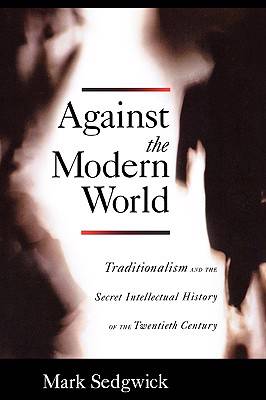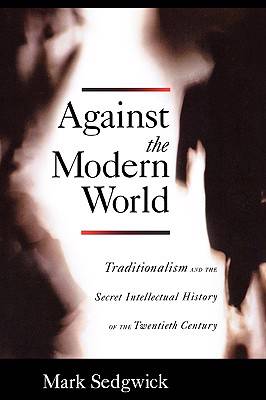
Je cadeautjes zeker op tijd in huis hebben voor de feestdagen? Kom langs in onze winkels en vind het perfecte geschenk!
- Afhalen na 1 uur in een winkel met voorraad
- Gratis thuislevering in België vanaf € 30
- Ruim aanbod met 7 miljoen producten
Je cadeautjes zeker op tijd in huis hebben voor de feestdagen? Kom langs in onze winkels en vind het perfecte geschenk!
- Afhalen na 1 uur in een winkel met voorraad
- Gratis thuislevering in België vanaf € 30
- Ruim aanbod met 7 miljoen producten
Zoeken
Against the Modern World
Traditionalism and the Secret Intellectual History of the Twentieth Century
Mark Sedgwick
Paperback | Engels
€ 52,45
+ 104 punten
Omschrijving
The first history of Traditionalism, an important yet surprisingly little-known twentieth-century anti-modern movement. Comprising a number of often secret but sometimes very influential religious groups in the West and in the Islamic world, it affected mainstream and radical politics in Europe and the development of the field of religious studies in the United States.
In the nineteenth century, at a time when progressive intellectuals had lost faith in Christianity's ability to deliver religious and spiritual truth, the West discovered non-Western religious writings. From these beginnings grew Traditionalism, emerging from the occultist milieu of late nineteenth-century France, and fed by the widespread loss of faith in progress that followed the First World War. Working first in Paris and then in Cairo, the French writer René Guénon rejected modernity as a dark age, and sought to reconstruct the Perennial Philosophy-- the central religious truths behind all the major world religions --largely on the basis of his reading of Hindu religious texts.
A number of disenchanted intellectuals responded to Guénon's call with attempts to put theory into practice. Some attempted without success to guide Fascism and Nazism along Traditionalist lines; others later participated in political terror in Italy. Traditionalism finally provided the ideological cement for the alliance of anti-democratic forces in post-Soviet Russia, and at the end of the twentieth century began to enter the debate in the Islamic world about the desirable relationship between Islam and modernity
In the nineteenth century, at a time when progressive intellectuals had lost faith in Christianity's ability to deliver religious and spiritual truth, the West discovered non-Western religious writings. From these beginnings grew Traditionalism, emerging from the occultist milieu of late nineteenth-century France, and fed by the widespread loss of faith in progress that followed the First World War. Working first in Paris and then in Cairo, the French writer René Guénon rejected modernity as a dark age, and sought to reconstruct the Perennial Philosophy-- the central religious truths behind all the major world religions --largely on the basis of his reading of Hindu religious texts.
A number of disenchanted intellectuals responded to Guénon's call with attempts to put theory into practice. Some attempted without success to guide Fascism and Nazism along Traditionalist lines; others later participated in political terror in Italy. Traditionalism finally provided the ideological cement for the alliance of anti-democratic forces in post-Soviet Russia, and at the end of the twentieth century began to enter the debate in the Islamic world about the desirable relationship between Islam and modernity
Specificaties
Betrokkenen
- Auteur(s):
- Uitgeverij:
Inhoud
- Aantal bladzijden:
- 384
- Taal:
- Engels
Eigenschappen
- Productcode (EAN):
- 9780195396010
- Verschijningsdatum:
- 13/07/2009
- Uitvoering:
- Paperback
- Formaat:
- Trade paperback (VS)
- Afmetingen:
- 155 mm x 231 mm
- Gewicht:
- 544 g

Alleen bij Standaard Boekhandel
+ 104 punten op je klantenkaart van Standaard Boekhandel
Beoordelingen
We publiceren alleen reviews die voldoen aan de voorwaarden voor reviews. Bekijk onze voorwaarden voor reviews.









